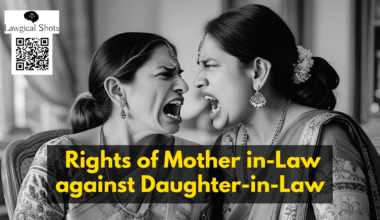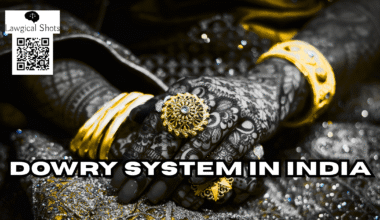Have you watched the Bollywood movie “Hum Saath Saath Hain”? If yes, then you must be very well aware of the concept of a Joint Hindu Family, and the urge to avoid partition. This is a concept which catches the eye and stands the Indian Family system out of the crowd. Though neutral families are a recent reality in cities, there still exist Hindu Joint Families having ancestral properties, in several parts of the country. With the status of a Joint Family, several perks are attached for its members and coparceners. So what Hindu Joint Family and Coparcenary Rights are all about? Is it just a bunch of people living together? Who is a coparcener and why is he/she so special? All such doubts have been addressed hereunder.
All About Joint Hindu Family and Coparcenary Rights
Composition of a Hindu Joint Family
A joint family comprises a common ancestor and his lineal male descendents upto any generations along with their wives/widows and children, including unmarried daughters. It may be noted that among the aforementioned, having a common ancestor is inevitable for bringing a Hindu Joint Family in existence. However, for its continuation, the presence of a common ancestor is not necessarily required. In other words, if the common ancestor dies, it does not mean the end of the Joint Hindu Family. Upper links in the lineage keep on leaving and new links keep on adding with marriage/birth/adoption. A joint family may never become extinct as long as the links keep on adding, and may continue infinitely till perpetuity.
Note – An illegitimate child is the member of his father’s joint family.
Corporate Personality v. Composite Family
A Joint Hindu Family is often confused with a corporate body due to the feature of perpetuity. However, it may be noted that a Joint Hindu Family is not a body corporate, nor a separate entity in the eyes of law. It is a unit of family members represented by its Karta in all legal and personal affairs. An outsider cannot be admitted to a Hindu Joint Family except through marriage (wife of male member) or adoption (child – son or daughter). It confers the status as a family member only by birth or marriage to a male member.
Touching upon the concept of a Composite Family, it is a part of custom wherein two or more families agree to live and work together, pool their resources, combine their gains and labour into a joint stock and eventually shoulder common risks. As against a Joint Hindu Family, there may be no blood relations or a common ancestor.
Also Read – “My Kids Hate Me”
Hindu Joint Family and Hindu Undivided Family
A Hindu Joint Family having a common family business is termed as a Hindu Undivided Family (HUF) for the purpose of tax assessment, revenue statuses, etc. It may be noted that a single male or female cannot make a Hindu Joint Family even if their assets are purely ancestral. On the other hand, there can be an HUF consisting of a man, his wife, daughters or widows of a sole surviving coparcener.
Presumption of Jointness
In case of Hindu Joint Families, it is presumed that the members are living in a state of jointness, unless the contrary is proved. Presumption in such cases is the strongest in case of father-son and brothers, and the one who alleges their separation has to prove the same satisfactorily.
The presumption of Joint Hindu Family usually pertains to jointness in food, worship and estate. If it is not joint in either of food/worship/estate, it does not necessarily imply the cease of Joint Family. Severance of any of these is strong evidence for the end of a joint family, but is not conclusive by itself.
Know more about gifts under Property Laws
No Presumption regarding Joint Property
Among the various features of Joint Hindu Family and Coparcenary is that there is no presumption that the property held by the members would be Joint Family properties. In fact, there is no presumption that the business conducted by a coparcener is Joint Family business. As per law, the existence of Joint property is not a precondition for the existence of a Joint Family. However, in practice, it is rare for a Joint Hindu Family having no joint property.
While a Karta is said to be the authorised face of a Joint Family, a property acquired by him in the name of his wife with his own money, there is no presumption of it to be Joint Family property. However, Karta has to prove the scenario, or otherwise, it will be considered as a Joint property.
Coparcenary
Coparceners constitute a narrow body of persons within a Hindu Joint Family and consists of father – daughter – son – son’s son – son’s son’s son, which means upto 4 degrees. It must be noted that descendents beyond 4 degrees are not coparceners until the death of the last holder or father. The difference between a Hindu Joint Family and Coparcenary can be understood with an example that a daughter-in-law is a member of Joint Family, but not a coparcener. Thus, she can stay in the Joint Hindu Family and enjoy all the perks as a member, but cannot initiate partition of the same since she is not a coparcener.
Also check Blogs covering variety of Topics of Law
Incidents of Coparcenary
The incidents which lead to coparcenary is the interest by birth in the Joint Family property. The said interest remains unpredictable and keeps on fluctuating – enlarged by deaths in the Joint Family, and diminished by following births in the said family. Karta being the decision maker in a Joint Hindu Family, every coparcener is bound by his/her decision regarding alienation of property, done for legal necessity, benefit of the estate and by legitimate acts of management.
Interest by Birth and Survivorship
The interest in a Hindu Joint Family and Coparcenary starts at the time of birth and goes on with survivorship. For example, if a father dies leaving behind a son, the son is his survivor and takes up his interest in the joint family as a coparcener.
Right to Maintenance
Every coparcener and every member of the Hindu Joint Family has a right to be maintained out of Joint Family funds, which also includes the right of marriage. A person who is disqualified from a Joint Hindu Family due to incapacity, etc. may still have the right to be maintained even after partition of ancestral property.
Coparcener’s right to restrain/challenge alienation
Being a coparcener, he/she has the right to restrain alienation of ancestral property, or challenge the same before the Court of law regardless of age. If a coparcener thinks that a joint property has been alienated and their interests have suffered due to the same, they may challenge the same.
Coparcener’s Right to Partition
Born in a Hindu Joint Family, coparceners have the right to partition. Only coparceners can seek partition of ancestral property, which ends the existence of a Joint Hindu Family. It may be noted that while members of a Joint Family have the right to be maintained, they cannot initiate partition.
Status of an Illegitimate Child
It is often assumed that only a legitimate child, i.e., a child born in a webslock has the right to be a coparcener. However, even an illegitimate child has the right to be a coparcener. However, the right may not be there when his/her father is alive. Only after death of the father can an illegitimate child become a coparcener, entitled to half the share of what he would have been eligible for had he been a legitimate child. In addition, after the father’s death, an illegitimate child can seek partition as a coparcener.
Coparcenary right of insane
In case of an insane coparcener in a Hindu Joint Family, he/she cannot claim a partition, and has no right to share in case of a partition. When cured of insanity, he/she retrieves both the rights. It may be noted that such an insane coparcener’s descendents are not excluded from their rights as a coparcener, to claim partition or getting their shares.








